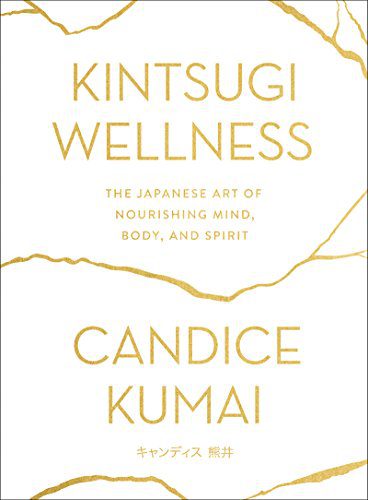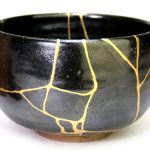Kintsugi Wellness is based on the philosophies of Japanese life and is organized into four parts: Strengthen, Nourish, Lifestyle, and Heart. At the core of Kintsugi Wellness is Self-Care, we are all broken but we can embrace our imperfections through self-acceptance, self-love, and self-care.
“In Japan, rituals are an important part of everyday life. These practices are prompts that remind you of what’s important, and ground you in the present while honoring the past.”
The book is divided into ten sections broken down into various Japanese Principles:
Wabi-sabi—Admire imperfection
Gaman—Live with great resilience
Eiyōshoku—Nourish your body
Ki o tsukete—Learn to take care
Ganbatte—Always do your best
Kaizen—Continuously improve
Shikata ga nai—Accept what cannot be helped
Yuimaru—Care for your inner circle
Kansha—Cultivate sincere gratitude
Osettai—Be of service to others, welcoming gifts”
Kintsugi – 金継ぎ, きんつぎ (keen tsu gee) – the japanese art of golden repair
The practice of kintsugi—repairing broken vessels by sealing the cracks with lacquer and carefully dusting them with gold powder—is a remarkable art. The Japanese believe the golden cracks make the pieces even more precious and valuable.
It’s beautiful to think of this practice as a metaphor for your life, to see the broken, difficult, or painful parts of you as radiating light, gold, and beauty. Kintsugi teaches you that your broken places make you stronger and better than ever before. When you think you are broken, you can pick up the pieces, put them back together, and learn to embrace the cracks.
Many of us are struggling to be better, to recharge, or to keep up. We’re constantly searching for the secret to self-improvement. But we know, on some deep level, that there is no secret. In order to heal and feel whole, we have to do the work.
“Through kintsugi, we learn it is okay to hurt and grieve. It is okay to be vulnerable. It is okay to accept and allow yourself the time to share, to open up, to exercise compassion.”
Like a map of your heart, kintsugi shows us the lessons and reveals the truth. As much as the struggle, the pain, the trials and tribulations sucked, even when things were not your fault, all of life’s hurt can be mended through golden repair. When we change our mind-set about our past, we have come out of the struggles as a much more beautiful and refined version of ourselves. Your kintsugi cracks become gold by doing the work.
Imperfection is the natural condition of everything. So much of beauty is in the eye of the beholder, and the more we open ourselves up to wabi-sabi, the more we begin to appreciate how our differences are what make us beautiful.
Wabi-Sabi – 侘び寂び, わびさび celebrate imperfection
Like kintsugi, wabi-sabi celebrates life’s imperfections, its tough stretches, and even its dark corners. It reminds us that life is transient, imperfection is natural, and there is beauty to be found in simplicity.”
“Wabi-sabi: The word wabi refers to being alone, or loneliness (wabi shi means “alone”) In poetry, the word wabi typically refers to something that is simple, humble, and in line with nature. It can also mean a simple, austere beauty.
Just as wabi-sabi can teach us to appreciate the beauty of a wilted flower or a chipped teacup, it can also teach us to appreciate—and reconsider—our physical forms. Whether it’s a scar, laugh lines, freckles, or gray hairs, wabi-sabi recognizes that difference is beauty.
mono no aware – 物 の 哀 れ, も の の あ わ れ – “the pathos of life, a gentle sadness”
Japanese culture embraces a more realistic approach. Life can’t always be perfect. There will be challenges, and if you expect them, they won’t take you by surprise. In Japanese culture, we are taught to embrace the difficulties with empathy and mindfulness.
The phrase mono no aware literally translates to “the pathos of things.” Like wabi-sabi, it refers to the transience of life. There is a mild sadness in this idea—mourning or grieving the fleeting nature of life—and in Japanese culture this is accepted as a reality rather than something to fight.
Mono no aware is about seeing things as they are. Sometimes they will be good, and sometimes they will be bad. Without darkness, light cannot exist. Mono no aware teaches us that while bad things do inevitably happen, it is our chance to practice empathy and compassion for others.
Gaman: 我慢, がまん –endure pain with patience, resilience, and tolerance
Beginning at an early age, the Japanese teach their children the principle of gaman—the ability to endure by remaining calm, patient, and resilient. When a Japanese child is hungry or complaining, her mom will respond to her, “Gaman!” Traditionally, the Japanese do not complain or react dramatically to challenging times. Rather, they prefer to be still and allow the storm to pass, as they quietly endure the changes along the course.
We need not wait for a storm to enter the picture in order to practice gaman. We can practice gaman in our everyday lives. No matter what is going on around you—a stressful workday, a bad mood (we’ve all been there), a misunderstanding—you can learn to practice resilience.
Gaman also teaches us not to make a situation worse by elevating the drama. Stop, take a moment, and remember to breathe. Once you’ve had a chance to pause and assess things calmly—only then—take action.
A huge part of adapting to the lives we are given is letting go of expectations—both those we set for ourselves and those others have of us. There are many things we can’t control, whether financial stress, a job loss, emotional turmoil, or the actions of a boss or a friend. The sooner we learn that we cannot control everything and make an effort to let go of those things we cannot change, the more we are able to find peace.
Ryōri 料理, りょうり: Cooking
The act of nourishing our bodies is a simple thing, but its effects are profound. Eating well allows us to respect and honor our body’s needs.
No body wants deprivation or restriction. Every body needs nutrients from real, whole foods to flourish—the same foods that nourished my ancestors and your ancestors for centuries. hat means lots of fresh produce, healthy protein, fermented foods, and unprocessed grains. Simple, seasonal, delicious food.
Ki o Tsukete – 気をつけて: Take Care
“Remember the airplane rule: Put on your own oxygen mask before helping others.”
If you give less energy to things that aren’t worth it, you’ll be able to open your heart to new things, new people, new friends, and new relationships. It’s simple math: You are able to add more to your life when you’ve subtracted something.
It may seem like we need to stay in touch with everyone, forever, but relationships evolve. As our lives change, so do the people in them. The measure of any friendship is simple: How does it make you feel? If the answer is “not great,” clean house. Don’t be afraid to un-follow, let go, and take better care of you. When you edit who takes up space in your life, you’ll begin to attract the right kind of people into your circle—those who are sincerely invested in your health and happiness.
Ganbatte – 頑張って, がんばって : always do your best
While kintsugi teaches us that there is beauty in the struggle, ganbatte says there is also beauty in the effort. Yes, the term ganbatte means that you must always give your best, but it also means that if you always do your best, that is good enough. You needn’t be too hard on yourself, or expect perfection. You don’t have to be the best, you just have to do your best.
prepare: Preparation is huge. If you prepare a tremendous amount—for whatever is coming up—you’ll be able to do your best. While preparation is specific to your situation, there are some things you should always do. Make sure to get plenty of rest. If that means no drinking caffeine that day, or putting your devices away and cutting the lights out early, do it.
Condition your mind to stay calm throughout preparation, as it will help you to focus. You don’t have to say yes to everything. When times are busy, don’t overcommit. Before an important time or event, nourish yourself properly, drink plenty of water, and eat fresh foods. Staying away from alcohol is also a smart choice. When you feel your best, you do better work.
Shikata Ga Nai – 仕方が無い, しかたがない: it cannot be helped
“SHIKATA GA NAI, ALSO KNOWN AS SHŌ GA NAI, しょうが な い, IS DERIVED FROM THE FORMAL SAYING: “DON’T KEEP COMPLAINING, MOVE ON FROM IT.”
At its essence, shikata ga nai (or shō ga nai) really means letting go. It means accepting what you cannot change and doing your best to let it roll off your back. It encourages you to take a step back from the drama in your life and remind yourself, “This won’t matter in five years, or five months (or in some cases, even five weeks), so I’m not going to give it more than five minutes.” And then wash your hands of it.
What you can change is the power and direction of your whole life, just by changing your mind-set. Take a deep breath. Ease up. Let it go.
roll with the punches
Shikata ga nai is all about rolling with the punches, allowing your sails to go in the direction of the wind. If you open your arms, your mind, your dreams, your sails to the wind, and you work in sync with all that life brings you, you will find that all things just get a little easier. It’s not always the strongest and smartest who go the furthest; it is often those who can adapt.
Yuimaru ゆ い まー る – inner circle of people
THE OKINAWAN CULTURE USES THE TERM YUIMARU, WHICH TRANSLATES TO “THE CIRCLE OF THE PEOPLE.” Yuimaru is a concept that celebrates the value of togetherness. It teaches us that our social networks, particularly our inner circle of close friends, heal us and help strengthen and nourish our entire community.
In life, we will inevitably go through tough times. It’s important to be mindful that we all need to rely on one another in order to survive. Sharing our successes amplifies them. Sharing our struggles makes them easier to endure. You’re not going to be able to make it alone. That’s why we are all here on this one big, crazy planet together. Whatever it is you are trying to accomplish, it helps to lean on your yuimaru.
Friendship is defined by actions, and it is also defined by not having to ask for what you need. Your true friends know just what you need and when, and they are happy to offer their support.
Kansha – 感 謝, か んし ゃ : Gratitude
ONE OF THE MOST IMPORTANT CONCEPTS IN YOUR WELLNESS PRACTICE—THE ONE THAT SUPPORTS ALL THE OTHERS—IS THE JAPANESE PHILOSOPHY KNOWN AS KANSHA. At its heart, kansha means “cultivating gratitude.” This includes gratitude for the gifts you’ve been given, for this moment, and for everything in this one lifetime.
kintsugi is life experience, and life experience allows us to have deeper, more meaningful empathy for one another.
All the Best in your quest to get Better. Don’t Settle: Live with Passion.



Comments are closed.